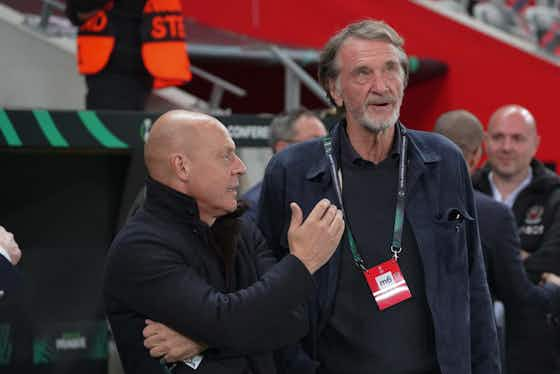EPL Index
·5. Juni 2025
How Man Utd remain within PSR limits despite heavy spending

In partnership with
Yahoo sportsEPL Index
·5. Juni 2025

As Manchester United push ahead with summer transfer plans — including a £62.5 million deal for Matheus Cunha and a £55 million opening offer for Bryan Mbeumo — questions are surfacing among rival supporters and financial observers. How, amid poor on-field performance and claims of financial peril, can a club that failed to qualify for Europe operate so freely under the Premier League’s profit and sustainability rules (PSR)?

Photo: IMAGO
The answer lies not in public perception but in the details of corporate structure, specifically, in a UK-registered company few outside financial circles had paid close attention to: Red Football Limited.
According to The Athletic, United’s compliance with PSR is judged based on the accounts submitted by Red Football Ltd, not the Cayman Islands-registered Manchester United plc. The result is a markedly different picture when analysing the figures used by the Premier League and UEFA.
United’s pre-tax loss for 2023–24 at plc level was a staggering £130.7 million. At Red Football Ltd, the figure was only £36.2 million. Over the three-year PSR assessment period, the plc reported losses totalling £311.9 million, while Red Football Ltd reported just £200.6 million — a £111.3 million difference that may prove pivotal to United’s financial sustainability.
Why the discrepancy? One reason is exceptional costs. While Ratcliffe’s minority stake acquisition incurred £47.8 million in plc-level exceptional items, just £4.5 million were recorded under Red Football Ltd. Furthermore, finance costs stood at £61.4 million at plc level but only £21.1 million at Red Football Ltd — the rest accounted for in Red Football Joint Venture Limited (RFJVL), which falls outside the PSR submission scope.

Photo: IMAGO
Red Football Ltd also recorded £25.1 million in intra-group interest income due to formalised loans to RFJVL, while recharging £10.5 million of staff services across group entities. These measures significantly reduced its bottom-line loss.
Sources told The Athletic that such intra-group interest income is excluded from PSR calculations, as are foreign exchange gains like the £12.4 million seen in Red Football Ltd’s accounts. Yet even after these adjustments, the PSR picture remains far more favourable than feared.
Red Football Ltd’s adjusted three-year loss stands comfortably below the £105 million PSR threshold, especially when allowable deductions (academy, women’s football, community outreach) are applied. Estimates suggest United could lose another £141 million in 2024–25 and still comply.
Still, caution remains. United’s cash flow is under pressure. As of December, £95.5 million remained in the bank, despite a £238.5 million injection from Ratcliffe. Club debt sits at £731 million. Existing payment obligations on transfers like Antony and Casemiro leave United with little wiggle room without fresh capital or asset sales.

Ratcliffe has been candid:
“Even if we made no new signings this summer, we’d write a cheque for £89 million.”
Negotiations with Wolves over Cunha reportedly faltered on payment structure. Wolves insisted on three instalments, while United initially proposed five. Similar issues could emerge in their pursuit of Mbeumo and others.

Photo: IMAGO
Despite PSR compliance, the ability to execute transfers hinges on access to cash or credit. United’s revolving credit facility allows borrowing up to £300 million, £210 million of which had been used by the end of last year. This leaves £90 million available — if the board is comfortable drawing more.
But further drawdowns will increase the debt burden, and repayment will eventually come due. That is why player sales remain integral. Should a substantial offer for Bruno Fernandes materialise, particularly from Saudi Arabia, it would give United both PSR and cashflow flexibility.

Photo IMAGO
Old Trafford executives argue their practices align with the “spirit and letter” of financial rules, and no charges have been brought by either UEFA or the Premier League. The Athletic estimates that even under stricter UEFA rules, United would pass the test, although they avoid it this season by missing out on European competition.
The Red Football Ltd strategy is not unique. When Chelsea were sold in 2022, £49.75 million in director payments were booked via Blueco 22 Ltd — not Chelsea FC — keeping them off the club’s PSR record. At Manchester City, UEFA-reported £475.8 million wage bill for 2023–24 exceeded club-disclosed figures by over £63 million, showing that discrepancies across legal entities are not uncommon.
What matters is whether these discrepancies fall inside or outside the PSR reporting perimeter — a distinction that allows clubs to lawfully optimise their reporting without breaching regulations.
Despite concerns, United’s use of Red Football Ltd in PSR submissions gives them greater short-term headroom than many anticipated. Their current PSR test, covering 2023–25, includes a modest £36.2 million pre-tax loss for 2023–24. From 1 July 2025, a new cycle begins, but with another low-loss year already on the books, United enter it in a position of relative strength.
What they cannot ignore is liquidity. Transfers cannot be paid with PSR compliance alone. Until television revenues grow, European football returns and debts are trimmed, United’s ability to act will depend as much on financial discipline as it does regulatory breathing space.
This isn’t exactly a reassuring picture, even if it technically adds up.
Yes, Red Football Ltd shows the club is well within PSR limits, but it feels like they’re managing compliance through accounting gymnastics rather than sound footballing decisions. It’s difficult to see Wolves or Brentford caring about which subsidiary their payments come from if they can’t offer the cash upfront.
The club talks about moving smartly in the market, but the financial hangover from expensive, underperforming signings — Sancho, Antony, Casemiro — is haunting them. If Ratcliffe has to remind the fans that they’d still owe £89 million before signing anyone new, then where exactly is the money coming from for Mbeumo or a top-tier centre-back?
What’s even more frustrating for the fanbase is knowing they’re not in Europe. That should be the time to reset, clear the books, reshape the squad and rebuild sustainably. But instead, United are still chasing short-term deals while the debt climbs higher.
They may not be in danger of breaching PSR. But they’re still miles from being a well-run football club. And that’s what should concern every fan heading into this summer.



























































